Related Posts
Get Ski-Ready: Our Guide to Slope Success
Ski season is here, and it’s time to get your body and gear ready for the slopes. Skiing demands strength, flexibility, and precision, so preparation is crucial to ensure top performance and minimise your risk of injury.
Unlock Your Full Potential with Metabolic Testing in Hertford and Hitchin
Discover How Metabolic Testing Can Help You Optimise Fitness, Nutrition, and Health Goals
Cold Weather Warm-Ups: Essential Exercises to Prevent Injury
As temperatures drop, staying active is important for both physical health and mental well-being. However, cold weather brings specific challenges for our muscles, joints, and mobility.
The Carter & George Marathon Preparation Programme
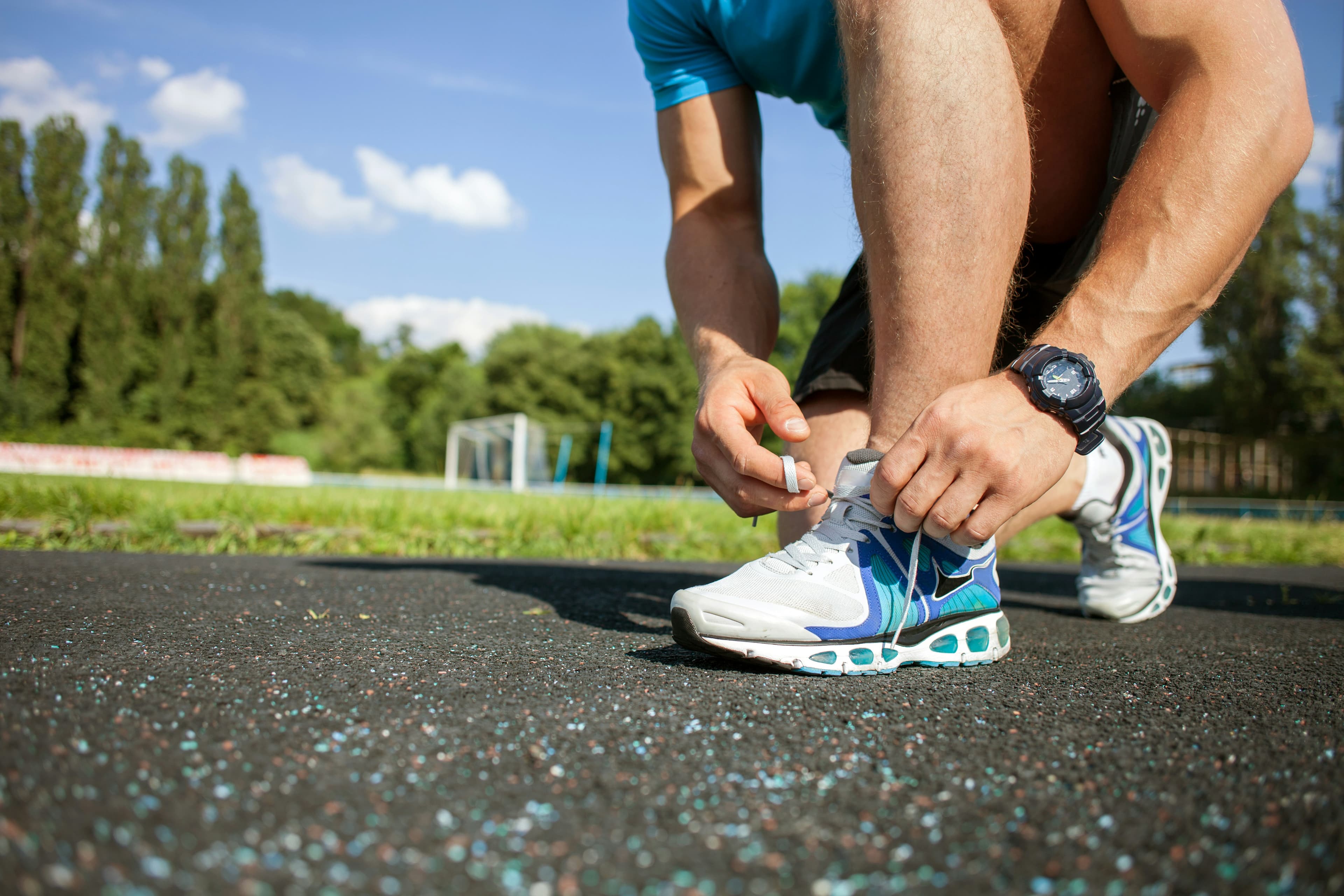
What is the Carter & George Marathon Preparation Programme?
The Carter & George Marathon Preparation Programme is a comprehensive running strength and conditioning initiative designed to optimize participant performance and mitigate risks associated with injury during the marathon training process.
The programme incorporates a holistic approach, emphasizing both physical preparation and injury prevention strategies.
This integrated approach ensures participants are not only physically primed for the marathon but are also equipped with knowledge to maintain their health throughout their training journey.
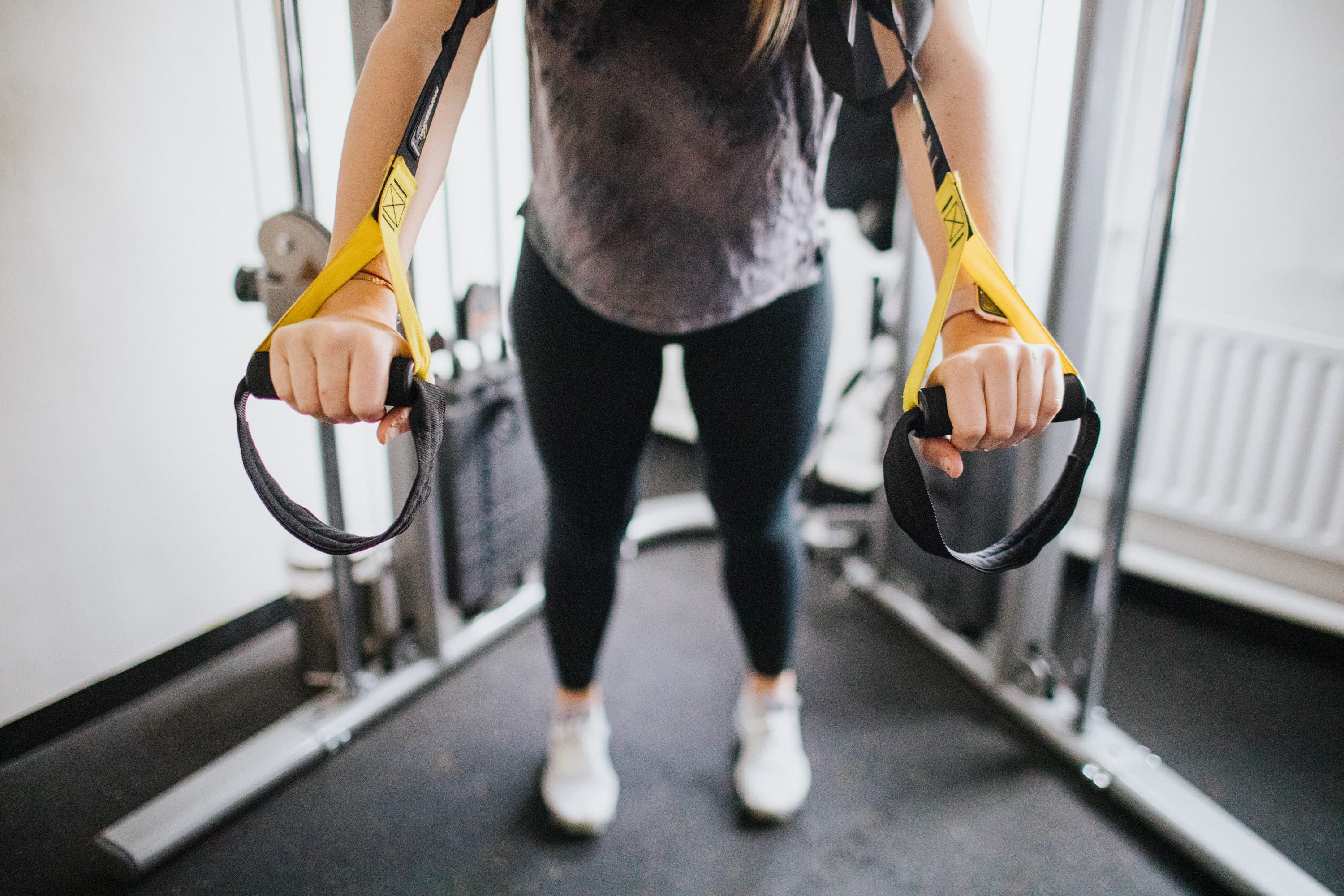 The Importance of Preparation
The Importance of Preparation
Marathon training is as much a mental game as it is a physical one. Preparation is of paramount importance because running a marathon is an incredible endurance challenge which calls for both physical and mental resilience. It is not just about the capability to run 26.2 miles; it is about training your body to sustain this prolonged effort and your mind to persevere when fatigue sets in.
Adequate preparation also minimizes the risk of injuries, which are not uncommon in such high-intensity activities.
By gradually increasing the running distance and intensity during training, the body can adapt to the stress and strain, strengthening the muscles and joints and increasing cardiovascular capacity.
Furthermore, thorough preparation is key to developing a successful race-day strategy. It entails understanding one’s pace, nutrition, hydration, and recovery strategies.
Without sufficient preparation, runners risk hitting the proverbial “wall,” a state of physical and mental fatigue, often reached at the 20- mile mark. Proper marathon preparation is, therefore, essential for any runner aiming to complete a marathon successfully and safely.
Strength & Conditioning as Marathon Preparation
The role of strength and conditioning in marathon preparation cannot be overstated. These exercises enhance the body’s overall durability, enabling it to withstand the rigorous demands of marathon running.
Strength training targets key muscle groups used in running, including the quadriceps, hamstrings, and calves, which improves running efficiency and reduces fatigue. Conditioning exercises, on the other hand, boost the body’s cardiovascular capacity, enabling a runner to maintain a steady pace for longer periods. Your program may include interval training,
Moreover, strength and conditioning exercises are essential for injury prevention. They fortify the body’s musculoskeletal system, enhancing joint stability and muscle balance.
By strengthening the body’s weaker areas and correcting muscular imbalances, runners can significantly reduce the risk of common injuries like knee pain, shin splints, or stress fractures.
Our coaches can help incorporate strength and conditioning exercises into your advanced plan and can greatly enhance your performance while safeguarding your body from potential injuries and providing valuable tips on your marathon training journey .
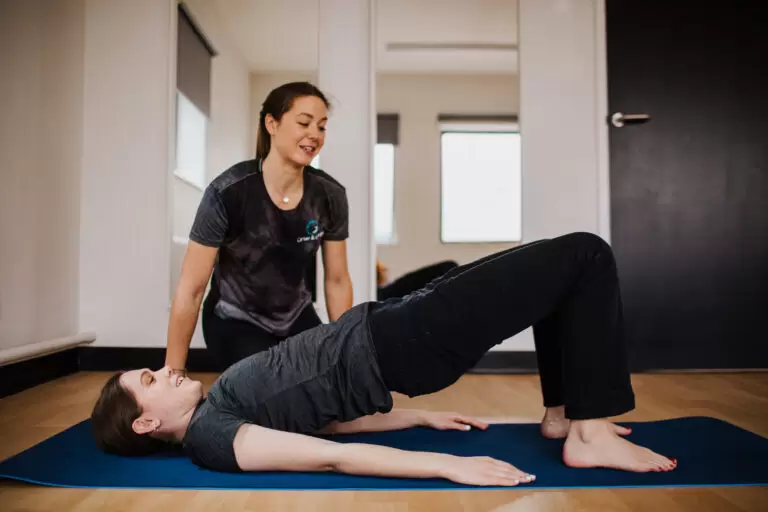 Injury Screening to Guide Marathon Training
Injury Screening to Guide Marathon Training
Injury screening is a crucial component of the Carter & George Marathon Preparation Programme, serving as a guiding compass for personalized marathon training.
By conducting a comprehensive analysis of a runner’s biomechanics, muscular strength, flexibility, and balance, injury screening identifies potential areas of vulnerability and the risk of injury. It illuminates any existing musculoskeletal irregularities or weaknesses that could potentially lead to an injury during training or the race itself.
Once these potential risk areas are identified, targeted strength and conditioning exercises can be implemented into the training regimen.
This tailored approach not only aids in enhancing performance but also in bolstering the body’s resilience, thereby reducing the likelihood of sustaining injuries. Furthermore, periodic injury screening throughout the training process allows for the monitoring of progress and the adjustment of the training program as needed.
In essence, injury screening is an invaluable tool that empowers runners to train smarter, not just harder, paving the way for a safer and more effective marathon preparation journey.
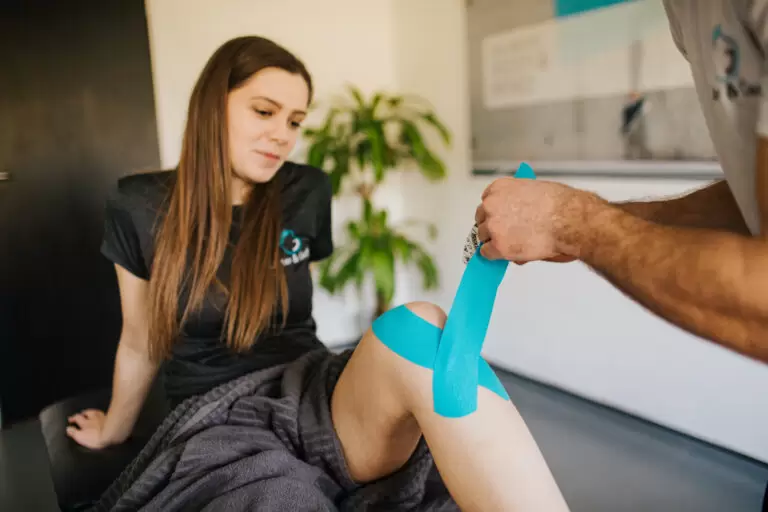 Footscan and Gait Analysis for Runners
Footscan and Gait Analysis for Runners
Footscan and gait analysis serve as indispensable tools in the realm of running training, particularly in enhancing performance and preventing injuries.
Footscan technology provides a detailed assessment of a runner’s foot mechanics, identifying aspects such as arch height, pressure distribution, and foot alignment. This information allows for the detection of any abnormalities that may contribute to inefficient running patterns or potential injuries.
Footscan, offers a comprehensive evaluation of a runner’s walking and running motion. By analyzing factors such as stride length, foot strike pattern, and joint motion, it aids in identifying biomechanical anomalies that could impede performance or lead to overuse injuries.
This wealth of information enables the development of customised training programs and the recommendation of specific running shoes that best suits an individual’s running style. Additionally, they can inform the design and implementation of corrective exercises to address any identified weaknesses or imbalances, enhancing running efficiency and reducing the risk of injury.
Ultimately, Footscan and gait analysis empower runners with insights into their unique biomechanics, helping them to optimally align their training strategies with their physical attributes and goals. This data-driven approach paves the way for a more effective and sustainable running journey.
 The Benefits of Sports Massage in Marathon Running
The Benefits of Sports Massage in Marathon Running
Sports massage is a potent tool in the arsenal of marathon runners, providing significant benefits both pre-and post-race.
Before a race, a sports massage can serve to prepare the body for the rigorous physical demands of a marathon. It stimulates blood flow to the muscles, enhancing the supply of oxygen and nutrients vital for optimal performance.
It also aids in the flexibility and mobility of muscle tissues, reducing the risk of cramps, strains, or other related injuries. Additionally, pre-race massage can help calm the nerves, reducing mental tension and promoting focus and relaxation.
Following a race, sports massage plays an equally critical role. It aids in the recovery process by alleviating muscle tension and helping to expedite the removal of metabolic waste products accumulated during the race. This process reduces muscle soreness and stiffness, accelerates the healing process, and can help identify any areas of strain that may need further attention.
In essence, sports massage before and after a race can enhance performance, speed up recovery, and prevent injuries, making it an essential component of any marathon runner’s regimen.
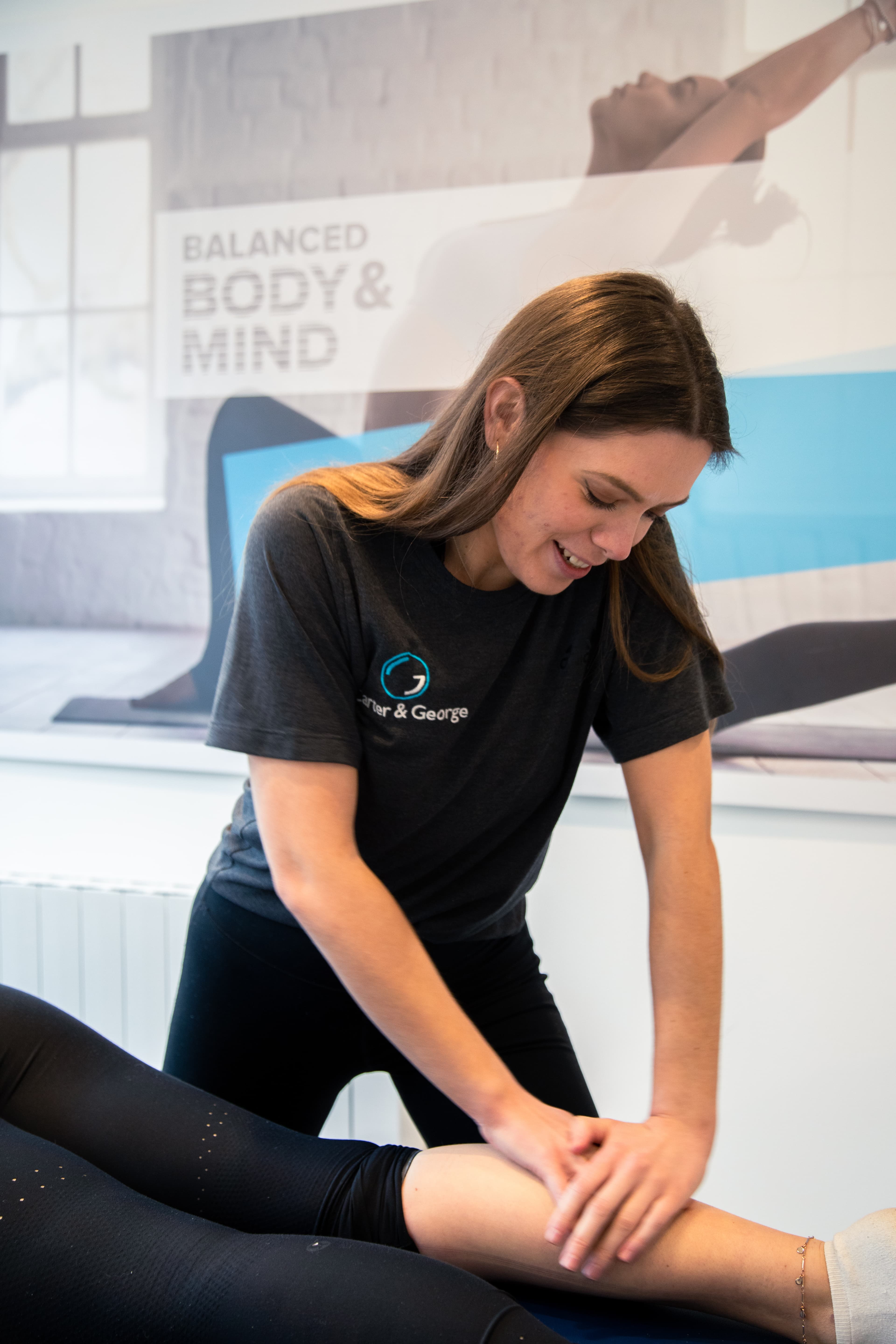 Carter & George Marathon Preparation Programme
Carter & George Marathon Preparation Programme
The Carter & George Marathon Training Program marathon training program is a comprehensive running strength and conditioning program meticulously designed to maximize performance and minimize the risk of injury during marathon training.
Cost of the programme
The programme is priced at £995 and includes a range of support, training and data led insight. Find out more about what is included below.
What’s included in the programme?
The program commences with an injury screening to evaluate potential risk areas before the training starts. This is followed by 16 Strength and Conditioning (S&C) sessions that can be flexibly completed either twice weekly over 8 weeks or once weekly over 16 weeks, depending on the runner’s availability and comfort.
Around the halfway mark (6-7 weeks into the program), a second injury screening is carried out. This screening serves as a review point to observe changes, measure progress, and inform the remainder of the program.
Another crucial component of the preparation program is a Footscan assessment at the onset.
This assessment offers a detailed evaluation of the runner’s biomechanics to detect any potential issues. If necessary, orthotics can be ordered, or specific exercises may be incorporated into the program to mitigate any problems identified during the assessment.
Finally, the program includes a sports massage session in the week before and after the marathon. These massages are designed to prepare the body for the race, enhance recovery post-race, and identify any areas of strain needing further attention.
In essence, the Carter & George Marathon Preparation Programme is a well-rounded package offering a structured and data-driven approach to marathon training, enhancing runners’ performance and resilience on their marathon journey.